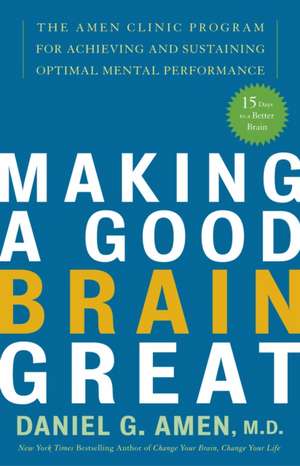Making a Good Brain Great: The Amen Clinic Program for Achieving and Sustaining Optimal Mental Performance
Autor Daniel G. Amenen Limba Engleză Paperback – 30 noi 2006
You probably run, lift weights, or do yoga to keep your body in great shape; you put on sunscreen and lotions to protect your skin; but chances are you simply ignore your brain and trust it to do its job. People unknowingly endanger or injure their brains, stress them by working at a frenzied pace and not getting enough sleep, pollute them with caffeine, alcohol, and drugs, and deprive them of proper nutrients. Brain dysfunction is the number one reason people fail at school, work, and relationships. The brain is the organ of learning, working, and loving—the supercomputer that runs our lives. It’s very simple: when our brains work right, we work right—and when our brains have trouble, we have trouble in our lives.
Luckily, it’s never too late: the brain is capable of change, and when you care for it, the results are amazing. Making a Good Brain Great gives you the tools you need to optimize your brain power and enrich your health and your life in the process. The principles and exercises in this book, based on years of cutting-edge neuroscience research and the experiences of thousands of people, provide a wealth of practical information to teach you how to achieve the best brain possible. You will learn:
•how to eat right to think right
•how to protect your brain from injuries and toxic substances
•how to nourish your brain with vitamins and do mental workouts to keep it strong
•the critical component of physical exercise, and which kinds work best
•how to rid your brain of negative thoughts, counteract stress, and much more
Full of encouraging anecdotes from Dr. Amen’s many years of experience, Making a Good Brain Great is a positive and practical road map for enriching and improving your own greatest asset—your brain.
From the Hardcover edition.
Preț: 115.65 lei
Nou
Puncte Express: 173
Preț estimativ în valută:
22.14€ • 24.05$ • 18.61£
22.14€ • 24.05$ • 18.61£
Carte tipărită la comandă
Livrare economică 21 aprilie-05 mai
Preluare comenzi: 021 569.72.76
Specificații
ISBN-13: 9781400082094
ISBN-10: 1400082099
Pagini: 313
Ilustrații: 30 B&W IMAGES THROUGHOUT
Dimensiuni: 132 x 201 x 25 mm
Greutate: 0.32 kg
Editura: Three Rivers Press (CA)
ISBN-10: 1400082099
Pagini: 313
Ilustrații: 30 B&W IMAGES THROUGHOUT
Dimensiuni: 132 x 201 x 25 mm
Greutate: 0.32 kg
Editura: Three Rivers Press (CA)
Recenzii
“This book is wonderful. It gives the reader great understanding and hope that changes in oneself can be made. If you put these changes into action, a happy and healthy brain is yours.” —Bill Cosby
“Each of Daniel Amen’s books contains special nuggets that can be found nowhere else, as well as a wealth of useful, general information that he brings together under one roof. This book offers excellent advice as well as a great deal of new information. An extremely useful and easy-to-read book.” —Edward Hallowell, M.D., author of Delivered from Distraction and The Childhood Roots of Adult Happiness
“Making a Good Brain Great is the long-awaited synthesis of a true visionary’s work. I highly recommend it to anyone interested in self-improvement, and especially parents and other caregivers of children—this book is a gem for those of us who want to raise healthy kids.” —Michael Gurian, author of The Minds of Boys and The Wonder of Girls
“The most important gift we have to share is wisdom. In this timely book, Dr. Amen shows us how to create a great brain so we can make the world a better place.” —Dharma Singh Khalsa, M.D., president/medical director of the Alzheimer’s Prevention Foundation, and author of The Better Memory Kit and The End of Karma
“A must-read for those who live by their wits.” —Dennis B. Alters, M.D., child, adolescent, and adult psychiatry, and author of Wizard’s Way
From the Hardcover edition.
“Each of Daniel Amen’s books contains special nuggets that can be found nowhere else, as well as a wealth of useful, general information that he brings together under one roof. This book offers excellent advice as well as a great deal of new information. An extremely useful and easy-to-read book.” —Edward Hallowell, M.D., author of Delivered from Distraction and The Childhood Roots of Adult Happiness
“Making a Good Brain Great is the long-awaited synthesis of a true visionary’s work. I highly recommend it to anyone interested in self-improvement, and especially parents and other caregivers of children—this book is a gem for those of us who want to raise healthy kids.” —Michael Gurian, author of The Minds of Boys and The Wonder of Girls
“The most important gift we have to share is wisdom. In this timely book, Dr. Amen shows us how to create a great brain so we can make the world a better place.” —Dharma Singh Khalsa, M.D., president/medical director of the Alzheimer’s Prevention Foundation, and author of The Better Memory Kit and The End of Karma
“A must-read for those who live by their wits.” —Dennis B. Alters, M.D., child, adolescent, and adult psychiatry, and author of Wizard’s Way
From the Hardcover edition.
Notă biografică
Daniel G. Amen, M.D., is a clinical neuroscientist, psychiatrist, and brain-imaging expert who heads up the world-renowned Amen Clinics. He is a Distinguished Fellow of the American Psychiatric Association and has won numerous writing and research awards. He writes a monthly column in Men’s Health called “Head Check” and has published nineteen books, numerous professional and popular articles, and a number of audio and video programs. His books include Preventing Alzheimer’s, Healing Anxiety and Depression, Healing the Hardware of the Soul, Healing ADD, and the New York Times bestseller Change Your Brain, Change Your Life. He is an internationally renowned keynote speaker and a popular guest expert for the media, with appearances on CNN, the Today show, The View, and other venues.
From the Hardcover edition.
From the Hardcover edition.
Extras
CHAPTER 1: YOUR BRAIN IS INVOLVED IN EVERYTHING YOU DO
The great sins of the world take place in the brain: but it is in the brain that everything takes place . . . It is in the brain that the poppy is red, that the apple is odorous, that the skylark sings, (and that we love and hate each other). —Oscar Wilde
Your brain is involved in everything you do. This is the first principle of the Amen Clinics. The sensation of waking up cuddled next to your husband’s or wife’s warm body is felt in the brain. The brain directs your urge to make love and be physically close. Getting ready for the day by planning, grooming, eating, and communicating with your husband and kids is directed by the brain. Negotiating traffic, while talking on your cell phone, is a result of your brain giving orders. Managing your business, planning trips, evaluating employees, running meetings, attending luncheons, and answering e-mails are all accomplished by your brain’s hard work. Leaving the office on time, playing tennis, lifting weights, and joking with your friends to unwind are activities spearheaded by the brain. Enjoying the sunset, helping the kids with homework, and assisting your wife with dinner are a result of moment-by-moment brain function. Your brain is the command and control center that runs your life.
Our work at the Amen Clinics is based on nine deceptively simple principles. Understanding these ideas will lay the foundation for making a good brain great. These principles stem directly from the brain-imaging work that we have been doing intensely for the past fifteen years. Do not let the simplicity of these principles fool you. If you allow them to become part of your everyday life, they will change nearly everything you do in the direct service of brain health.
PRINCIPLE 1: Your brain is involved in everything you do.
How you think, how you feel, how you act, and how well you get along with other people has to do with the moment-by-moment functioning of your brain. Most people know that the brain is the organ of behavior, but few people understand this principle at a deep emotional level. We spend more time and money on beautifying our hair, our skin, our clothes, and our homes than we do on caring for our brain. After looking at over thirty thousand brain scans, I have come to realize that how your brain works influences every part of who you are and what you do: from athletic skills to parenting, from management skills to your free time activities, from social aptitude to artistic talent, and from driving ability to the type of music you like. Look at any aspect of behavior—relationships, school, work, religion, sports—and in the middle of it all is brain function.
Let’s take four common examples of behavior and look at them through the lens of this first principle: motherhood, business management, dating, and attending a sporting event.
There are many different types of mothers. There are mothers, like my own, who are outgoing, relaxed, fun-loving, upbeat, and playful. There are mothers who are more serious, who focus on their children’s faults or tend to be too busy or preoccupied to play with them. There are mothers who constantly push their children to be their best and mothers who lead quietly by example. There are mothers who use guilt and nagging as the primary motivator of behavior, and mothers who cheer a child’s every positive move. Ultimately, the type of mother a woman may be is determined by her brain. Mothers who are more serious tend to have higher amounts of activity in the prefrontal cortex (PFC). The prefrontal cortex is involved with goal-setting, planning, forethought, and judgment. High PFC levels are involved with goal-oriented behavior. Outgoing, playful, less serious mothers have a little less activity in this part of the brain. Guilt-driven mothers tend to have higher activity in the brain’s emotional centers (limbic brain), which in turn causes them to focus on the negative, such as all of her child’s faults. Few people know that the type of mother they have has everything to do with the moment-by-moment functioning of her brain.
There are in the world just as many different types of business managers as mothers, based in part on brain function. There are motivational managers and quiet managers. There are absent managers and micromanagers. There are managers who scream and yell to get their way and managers who encourage. There are managers who enjoy firing people and managers who hold on to employees much longer than they should. Managers who have high PFC activity tend to be very involved and directive; taken to an extreme, they are micromanagers. Managers with low PFC activity tend to be idea people and relatively hands-off; taken to an extreme, they are absent. A part of the brain that we will discuss in detail later on is the anterior cingulate gyrus, which runs lengthwise through the front part of the brain. It is the brain’s gear shifter, allowing you to be flexible and shift between tasks. Managers who have good activity in this part of the brain tend to be flexible and are able to adapt to changes in the business climate. Managers who have excessive activity in this part of the brain tend to be rigid and inflexible. These managers tend to hold on to patterns of behavior long after they are helpful. Even though brains run businesses, few people think about the brain at work.
Our species has many varied ways to, as my eighteen-year-old daughter would say, hook up. Dating and mating are brain functions, even though the urges may feel like they come from lower in your body. There are shy people who rely on random chance to find a mate. There are outgoing people who will ask a hundred or more potential partners out on a date in search of their one true love. There are thoughtful, planning daters and those who do courtship on the spur of the moment. There are commitment-phobic daters who run at the first signs of attachment and those who commit too easily. There are people who are overwhelmed by feelings of insecurity and jealousy and those who lack sufficient caring. In the center of the dating scene is the brain. The brain allows us to pay attention to potential mates, to evaluate their suitability for us, to attach, to care, and to draw people toward us or push them away. The brain helps us evaluate honesty, fidelity, and reliability. Healthy PFC activity helps us follow through on our commitments, showing the other person that we are reliable, predictable, and likely to make a good dad or mom. Lower levels of activity in the PFC will make us more spontaneous and fun (with less forethought) but may also make us late for appointments, too pushy for early sex, and more driven by emotion. We often judge our dates based on looks, but we rarely consider their brain function. I believe this will change in the coming century. In fact, if you date my daughter for more than four months, you have to get a brain scan to determine if you can continue to see her. I’m not kidding.
There are many different types of sports fans, depending again, in part, on brain function. I watch many sports fans at the Staples Center in Los Angeles and at Angels Stadium in Anaheim, while undergoing the trials, tribulations, and joys of rooting for the Los Angeles Lakers and the Anaheim Angels. My big brother, Jim, is an intense fan. He yells at the referees and umpires when he thinks they make a mistake, and he often loudly second-guesses the coaches and managers when they play the subs. There are quiet fans who show little emotion and fans who seem as though they are going to wet their pants when the home team makes a mistake. There are forgiving fans and fans who hold grudges. There are fans who lack PFC activity and throw objects onto the court or field and fans with high PFC activity who worry the whole game through. There are fans who are rude to people who wear opposing jerseys and fans who make friends with the people around them. There are pseudofans who show up to be seen (Lakers games are always events), and fans who cry when the home team loses. There are family fans who use sporting events as a bonding mechanism, between father and son (or in my case, between father and two daughters). As the brain is involved in athletic skill, it is also involved in the type of sports fan you are.
The first principle, like all of the principles, is very simple. Your brain is involved in every aspect of your life and the person you are.
From the Hardcover edition.
The great sins of the world take place in the brain: but it is in the brain that everything takes place . . . It is in the brain that the poppy is red, that the apple is odorous, that the skylark sings, (and that we love and hate each other). —Oscar Wilde
Your brain is involved in everything you do. This is the first principle of the Amen Clinics. The sensation of waking up cuddled next to your husband’s or wife’s warm body is felt in the brain. The brain directs your urge to make love and be physically close. Getting ready for the day by planning, grooming, eating, and communicating with your husband and kids is directed by the brain. Negotiating traffic, while talking on your cell phone, is a result of your brain giving orders. Managing your business, planning trips, evaluating employees, running meetings, attending luncheons, and answering e-mails are all accomplished by your brain’s hard work. Leaving the office on time, playing tennis, lifting weights, and joking with your friends to unwind are activities spearheaded by the brain. Enjoying the sunset, helping the kids with homework, and assisting your wife with dinner are a result of moment-by-moment brain function. Your brain is the command and control center that runs your life.
Our work at the Amen Clinics is based on nine deceptively simple principles. Understanding these ideas will lay the foundation for making a good brain great. These principles stem directly from the brain-imaging work that we have been doing intensely for the past fifteen years. Do not let the simplicity of these principles fool you. If you allow them to become part of your everyday life, they will change nearly everything you do in the direct service of brain health.
PRINCIPLE 1: Your brain is involved in everything you do.
How you think, how you feel, how you act, and how well you get along with other people has to do with the moment-by-moment functioning of your brain. Most people know that the brain is the organ of behavior, but few people understand this principle at a deep emotional level. We spend more time and money on beautifying our hair, our skin, our clothes, and our homes than we do on caring for our brain. After looking at over thirty thousand brain scans, I have come to realize that how your brain works influences every part of who you are and what you do: from athletic skills to parenting, from management skills to your free time activities, from social aptitude to artistic talent, and from driving ability to the type of music you like. Look at any aspect of behavior—relationships, school, work, religion, sports—and in the middle of it all is brain function.
Let’s take four common examples of behavior and look at them through the lens of this first principle: motherhood, business management, dating, and attending a sporting event.
There are many different types of mothers. There are mothers, like my own, who are outgoing, relaxed, fun-loving, upbeat, and playful. There are mothers who are more serious, who focus on their children’s faults or tend to be too busy or preoccupied to play with them. There are mothers who constantly push their children to be their best and mothers who lead quietly by example. There are mothers who use guilt and nagging as the primary motivator of behavior, and mothers who cheer a child’s every positive move. Ultimately, the type of mother a woman may be is determined by her brain. Mothers who are more serious tend to have higher amounts of activity in the prefrontal cortex (PFC). The prefrontal cortex is involved with goal-setting, planning, forethought, and judgment. High PFC levels are involved with goal-oriented behavior. Outgoing, playful, less serious mothers have a little less activity in this part of the brain. Guilt-driven mothers tend to have higher activity in the brain’s emotional centers (limbic brain), which in turn causes them to focus on the negative, such as all of her child’s faults. Few people know that the type of mother they have has everything to do with the moment-by-moment functioning of her brain.
There are in the world just as many different types of business managers as mothers, based in part on brain function. There are motivational managers and quiet managers. There are absent managers and micromanagers. There are managers who scream and yell to get their way and managers who encourage. There are managers who enjoy firing people and managers who hold on to employees much longer than they should. Managers who have high PFC activity tend to be very involved and directive; taken to an extreme, they are micromanagers. Managers with low PFC activity tend to be idea people and relatively hands-off; taken to an extreme, they are absent. A part of the brain that we will discuss in detail later on is the anterior cingulate gyrus, which runs lengthwise through the front part of the brain. It is the brain’s gear shifter, allowing you to be flexible and shift between tasks. Managers who have good activity in this part of the brain tend to be flexible and are able to adapt to changes in the business climate. Managers who have excessive activity in this part of the brain tend to be rigid and inflexible. These managers tend to hold on to patterns of behavior long after they are helpful. Even though brains run businesses, few people think about the brain at work.
Our species has many varied ways to, as my eighteen-year-old daughter would say, hook up. Dating and mating are brain functions, even though the urges may feel like they come from lower in your body. There are shy people who rely on random chance to find a mate. There are outgoing people who will ask a hundred or more potential partners out on a date in search of their one true love. There are thoughtful, planning daters and those who do courtship on the spur of the moment. There are commitment-phobic daters who run at the first signs of attachment and those who commit too easily. There are people who are overwhelmed by feelings of insecurity and jealousy and those who lack sufficient caring. In the center of the dating scene is the brain. The brain allows us to pay attention to potential mates, to evaluate their suitability for us, to attach, to care, and to draw people toward us or push them away. The brain helps us evaluate honesty, fidelity, and reliability. Healthy PFC activity helps us follow through on our commitments, showing the other person that we are reliable, predictable, and likely to make a good dad or mom. Lower levels of activity in the PFC will make us more spontaneous and fun (with less forethought) but may also make us late for appointments, too pushy for early sex, and more driven by emotion. We often judge our dates based on looks, but we rarely consider their brain function. I believe this will change in the coming century. In fact, if you date my daughter for more than four months, you have to get a brain scan to determine if you can continue to see her. I’m not kidding.
There are many different types of sports fans, depending again, in part, on brain function. I watch many sports fans at the Staples Center in Los Angeles and at Angels Stadium in Anaheim, while undergoing the trials, tribulations, and joys of rooting for the Los Angeles Lakers and the Anaheim Angels. My big brother, Jim, is an intense fan. He yells at the referees and umpires when he thinks they make a mistake, and he often loudly second-guesses the coaches and managers when they play the subs. There are quiet fans who show little emotion and fans who seem as though they are going to wet their pants when the home team makes a mistake. There are forgiving fans and fans who hold grudges. There are fans who lack PFC activity and throw objects onto the court or field and fans with high PFC activity who worry the whole game through. There are fans who are rude to people who wear opposing jerseys and fans who make friends with the people around them. There are pseudofans who show up to be seen (Lakers games are always events), and fans who cry when the home team loses. There are family fans who use sporting events as a bonding mechanism, between father and son (or in my case, between father and two daughters). As the brain is involved in athletic skill, it is also involved in the type of sports fan you are.
The first principle, like all of the principles, is very simple. Your brain is involved in every aspect of your life and the person you are.
From the Hardcover edition.
Descriere
The brain is the organ of learning, working, and loving--the supercomputer that runs our lives. It's very simple: when our brains work right, we work right--and when our brains have trouble, we have trouble in our lives. "Making a Good Brain Great" provides the tools needed to optimize one's brain power and enrich health and life in the process.


















